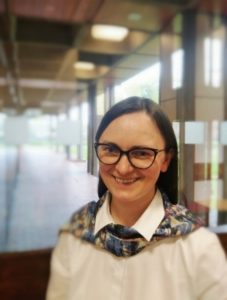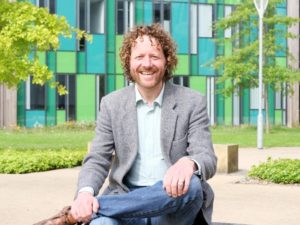An infographic describing a new method to repair and recycle a Li-ion battery pouch
Benign solvents for recycling and re-use of a multi-layer battery pouch
Jean E. Marshall, Bethany Middleton, Dominika Gastol, Roberto Sommerville, Con R. McElroy, Emma Kendrick and Vannessa Goodship
Mater. Adv., 2022, 3, 4973-4981, DOI: 10.1039/D2MA00239F

Meet the authors
 |
Dr. Jean Marshall gained her Ph.D. from the University of Cambridge in 2008, for investigating surface-initiated polymer chemistry. Her subsequent research work includes postdoctoral work on stimulus-responsive polymeric materials, as well as industrial experience in novel polymers for ink formulations. Since joining the Warwick Manufacturing Group (University of Warwick) in 2019, she has worked on several projects, covering diverse areas including tailored polymers for use in Lithium-ion batteries, polymeric materials as part of a circular economy, and recycling of battery components. |
 |
Dominika Gastol joined University of Birmingham in 2019 and has been involved in recycling of Li-ion batteries from EV since then. Her research activities cover development of material recycling streams combined with remanufacturing, automated methods of electrode deposition and advanced microscopic characterisation. |
 |
Rob gained a Ph.D. in Chemical Engineering from the university of Birmingham in 2017, where he worked on producing synthetic zeolites from fly ash. Rob worked at the University of Warwick for a year on Lithium-ion battery recycling under Professor Emma Kendrick, before returning to Birmingham to join the ReLiB project in 2018. Rob Sommerville is a Postdoctoral Research Fellow with a focus on reutilisation of waste and the circular economy of Lithium Ion Batteries. He is currently a Faraday Institution Research Fellow working on the ReLiB (Recycling and Reuse of Lithium Ion Batteries) project funded by the Faraday Institution, looking at physical separation techniques in the recycling of lithium-ion batteries. |
 |
Dr Rob McElroy gained his Ph.D in 2007 at Keele University working on the production of composite materials from copolymers incorporating renewable resources. In 2009 he joined Prof. Pietro Tundo’s Carbonate Chemistry Group at Ca Foscari University of Venice looking into applications of dialkyl carbonates. He joined the Green Chemistry Centre of Excellence, University of York as a PDRA in 2011 and has worked on a variety of projects including extraction and separation in supercritical CO2, greening of pharmaceutical chemistry, production of bio-derived polymers, production of bio-derived surfactants, running an industry facing club focusing on circular economy related research called RenewChem, development of new green solvents and solvent applications. His current role is looking at green solvents in electrode formulation and as deputy director of the Circa Renewable Chemistry Institute. |
 |
Following 14 years working in industry as a plastic engineer, Dr. Vannessa Goodship joined WMG, University of Warwick in 1997. She gained a PhD in 2002 on multi-material injection moulding and has continued working across multiple sectors on polymer related topics at the academic and industry interface. |
 |
Prof Emma Kendrick is Professor of Energy Materials, lead of the Energy Materials Group (EMG) in the School of Metallurgy and Materials and co-director of the Centre for Energy Storage (BCES) at the University of Birmingham (UoB). Her research focus is upon sustainable energy storage technologies, the objective to understand the science and engineering principles which underpin manufacturing and lifetime. Before UoB, she spent two years as Reader in WMG, University of Warwick, and before academia, she led innovations in the battery industry. Latterly as Chief Technologist in Energy Storage at SHARP Laboratories of Europe Ltd (SLE) and prior to that for two highly innovative lithium-ion battery SMEs, Fife Batteries Ltd and Surion Energy Ltd. She completed her PhD in Ceramics at Ceram Research and Keele University, MSc in New Materials at University of Aberdeen, and BSC in chemistry from the University of Manchester. |
An interview with Dr. Jean Marshall:
a) What aspect of your work are you most excited about at the moment and what do you find most challenging about your research?
I am currently gaining a lot of new knowledge about how lithium-ion batteries work and how complex they are as chemical systems. The electrochemistry of batteries is not necessarily an obvious area for a polymer chemist, but batteries are enormously complicated and there is a lot of scope for experimenting with novel materials in this area. The most difficult challenge here is deciding which research question to tackle first!
b) How do you feel about Materials Advances as a place to publish research on this topic?
Materials Advances is an excellent ‘home’ for our work. Open access publishing is great for us as academics and publishing with an RSC journal lends articles good credibility.
c) Can you share one piece of career-related advice or wisdom with other early career scientists?
Some researchers prefer to have laser-focus on one niche subject, and that’s definitely the approach that’s encouraged for gaining a PhD. However, in my ‘postdoctoral life’ I’ve definitely found that the most productive projects are really collaborative. So, my advice is to collaborate with as many people as possible, and make sure that they aren’t all in your direct field of research. The more people you talk to, the more you can bounce ideas around, and you’ll find yourself with far more new avenues to explore.

















